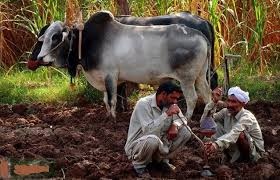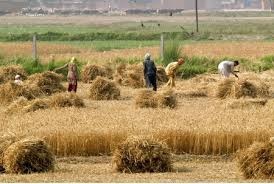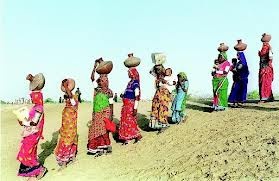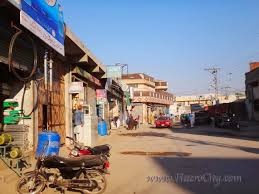Life in a Pakistani village is very interesting. As compared with the noise of towns, there is little activity in our villages. In a village the first thing that strikes a visitor is the crowd of houses. Most of them are mud-built and thatched. There are very few roads, and village paths are usually full of dust and m ud. The mos important centre of interest in a village is the village well. The women-folk of the village usually carry water in their clay pitchers. They sit beside the well and carry on their talk for hours together. Their capacity for cutting jokes is wonderful and, unlike the women in towns, they are much talkative. There are also shops in every village. In many cases these shops are quite lively. All the day long the elders of the village keep sitting there chatting, laughing and smoking. There is usually a primary school in every village, with only one teacher in it. His salary is very small, but the gifts, which he gets in the shape of ghee, wheat, maize and other things, are numerous.
ud. The mos important centre of interest in a village is the village well. The women-folk of the village usually carry water in their clay pitchers. They sit beside the well and carry on their talk for hours together. Their capacity for cutting jokes is wonderful and, unlike the women in towns, they are much talkative. There are also shops in every village. In many cases these shops are quite lively. All the day long the elders of the village keep sitting there chatting, laughing and smoking. There is usually a primary school in every village, with only one teacher in it. His salary is very small, but the gifts, which he gets in the shape of ghee, wheat, maize and other things, are numerous.
Usually out villagers lead a simple and hard life. They are honest, innocent and homely. They dress themselves in home-spun clothes. Their women too put on coarse and rough clothes. The main profession in our villages, of course, is agriculture. Our peasant gets up early in the morning and goes to work in his fields. He ploughs the land till about twelve o'clock, when his wife brings for him his lunch. After taking his simple meal the village farmer lies down under the shade of a tree to take some rest. After a short while he gets up and works till sunset. He earns his living with the sweat of his brow. Our villagers are well-known for their hospitality. Their behaviour towards visitors and strangers affords a contrast to the treatment they receive in towns.
course, is agriculture. Our peasant gets up early in the morning and goes to work in his fields. He ploughs the land till about twelve o'clock, when his wife brings for him his lunch. After taking his simple meal the village farmer lies down under the shade of a tree to take some rest. After a short while he gets up and works till sunset. He earns his living with the sweat of his brow. Our villagers are well-known for their hospitality. Their behaviour towards visitors and strangers affords a contrast to the treatment they receive in towns.
Usually our villagers live in a friendly way. This does not  mean that they do not have their quarrels or litigation. But mostly their quarrels are about women and land. It is very amusing to watch a villager quarrel. He can quarrel about anything. He quarrels about the right to water his fields and his right to check other people's animals from entering his barn. Thus, out villagers involve themselves in costly litigations and pay a heavy price for their foolishness.
mean that they do not have their quarrels or litigation. But mostly their quarrels are about women and land. It is very amusing to watch a villager quarrel. He can quarrel about anything. He quarrels about the right to water his fields and his right to check other people's animals from entering his barn. Thus, out villagers involve themselves in costly litigations and pay a heavy price for their foolishness.
Village customs are still very simple. Our villagers are very particular about their ceremonies regarding marriages and deaths, and there is no doubt that they will continue doing so even for centuries in future.
Our villages need a lot of improvement. Their streets are dirty and so are their wells, houses and bazars. Looked from the modern point o f view, our villages are very backward. Heaps of dung and dirt are seen every where. Thanks to the labour of some welfare workers, our villages are steadily getting rid of these drawbacks. On the whole, life in a village is dull affair. There are few facilities of education and, still fewer, recreations. Indeed we should try our best to make life worth-living in our villages.
f view, our villages are very backward. Heaps of dung and dirt are seen every where. Thanks to the labour of some welfare workers, our villages are steadily getting rid of these drawbacks. On the whole, life in a village is dull affair. There are few facilities of education and, still fewer, recreations. Indeed we should try our best to make life worth-living in our villages.



